Eta Sigma Phi Induction Ceremony
Students were inducted into the national Classics honor society, Eta Sigma Phi for the first in-person gathering since COVID-19.
A student of classics will study the Greek and/or Latin languages while immersing themselves in the many facets of ancient culture. Our emphasis on languages hones analytical skills and brings them to bear upon a critical awareness of our past, thus enriching our understanding of the present.
Sewanee's Department of Classics prepares students to investigate the literature and culture of the Greco-Roman world, enabling them not only to appreciate the texts but also to interrogate them critically. Students take part in a dynamic dialogue whose roots in ancient culture continue to provide a foundation for confronting today's pressing issues.
The department strongly believes that the mastery of Greek and/or Latin provides the best window into the culture and ethos of the ancient world, and consequently each of our majors and minors is built upon this premise. Apart from the intellectual discipline, many students benefit from study of the foundational languages of the legal and medical professions and the hard sciences. The University is a member of the Intercollegiate Center for Classical Studies in Rome, and majors are encouraged to spend a semester studying there.
Sewanee graduates secure positions in a variety of fields. Some you would expect, others are a bit of a surprise. Sewanee prepares you for your profession and your passion. Below is a sampling of recent graduates' first jobs.
Sewanee graduates enjoy extraordinary acceptance rates to top graduate and pre-professional programs–about 95 percent to law school and over 85 percent to medical school. Below is a sampling of where Sewanee grads continue their education.
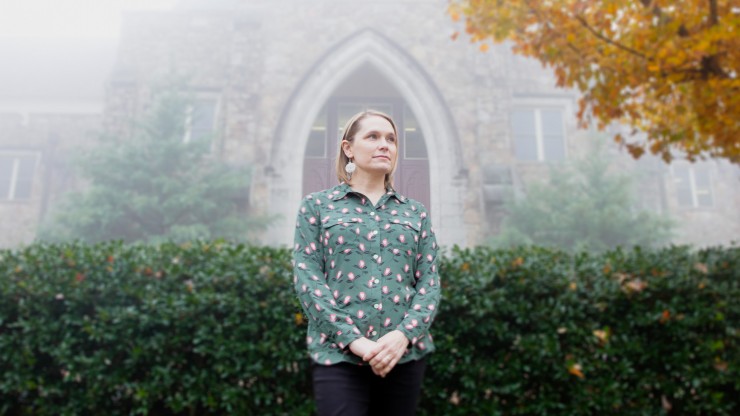
Tapped as the first female translator of Ovid's Metamorphoses into English verse, Classics Professor Stephanie McCarter takes a hard look at the way sexual violence has been—and might be—portrayed in translations of the myths.
At nearly 12,000 lines across 15 books, Ovid’s Metamorphoses stands as one of the most influential works of art in Western culture, inspiring future literary heavyweights including Dante, Chaucer, and Shakespeare. Completed around 8 A.D., the epic poem, written in Latin hexameter, traces a theme of transformation—and power—through more than 250 myths. Of these 250 tales, more than 50 depict sexual violence or rape.
Many previous translations have turned a blind eye to or reframed these scenes, positioning them as romantic and even titillating encounters where women are “ravished” or “enjoyed” without their consent. Other translations give a nod to rape but forgo more accurate translation in favor of euphemism, like translator Charles Martin’s “she gives in to him without complaint” or David Raeburn’s “the Sun was allowed to possess her”—each a description of the Sun’s rape of Leucothoe, a young woman caught in the crosshairs of a dispute between gods.
Leucothoe stands at the center of much of McCarter’s early inspiration for this new translation project. Before Penguin Classics approached McCarter, who holds a Ph.D. in classics from the University of Virginia, she found herself troubled by the lack of translations from which she could actually teach.
This course focuses on portrayals of Greek and Roman culture in film, with readings from classical and later literature in translation as well as criticism.
This course examines the historical and literary sources that provide us with knowledge about the development of Athens in the Archaic and Classical periods culminating in the Peloponnesian War. Emphasis is placed on examining the methods, biases, and goals of the historians Herodotus and Thucydides. Other authors considered include Sophocles, Aristophanes, the Sophists, Xenophon, Plato, and Aristotle.
This course examines sexual practices and the construction of sexuality in Greco-Roman antiquity. Drawing on both literary and artistic evidence, the course explores a wide range of topics, including sexual stereotypes, marriage, prostitution, pederasty, rape, adultery, and homoeroticism. Considerable attention is paid to the intersections of sex with gender, power, and social status.
Selected books of The Odyssey with supplementary reading.
One gospel and one epistle are read.
Selected plays of Aeschylus, Sophocles, and Euripides are read.
This course examines Caesar's presentation of the Civil Wars, including famous events such as the crossing of the Rubicon, the Battles of Dyrrhacium and Pharsalus, and the death of Pompey. Attention is also given to how these events are depicted in passages from Suetonius' Life of Julius Caesar and Lucan's epic poem, Pharsalia. The course aims not only to improve reading comprehension of Latin literature, but also to evaluate major sources for this critical period of Roman—indeed, all Western—history. It concludes with study of how Caesar's assassination is variously depicted.
This course examines the genre of prose fiction in Latin, with particular attention to the Satyricon of Petronius and the Metamorphoses (or "Golden Ass") of Apuleius.
A study of Roman elegy through selections from one or more of the following authors: Tibullus, Sulpicia, Propertius, and Ovid.

Daniel Holmes has taught at Sewanee since 2008. He has taught Ancient Greek at all levels, Greek literature in translation, mythology, and ancient drama, and has also taught in the interdisciplinary humanities program. His scholarly interests focus on the intersection of philosophy and literature in Greece of the 4th and 5th centuries B.C., especially in Greek drama, the Sophists, and Plato. Dr. Holmes taught previously at Loyola College in Maryland and the University of Miami.

Stephanie McCarter teaches Greek and Latin courses at all levels as well as courses in translation, and she is active in Sewanee’s interdisciplinary humanities program. Her research tends to center on the Latin poetry of the early Roman Empire, especially in relation to its philosophical and historical contexts. She also has research and teaching interests in women, gender, and sexuality in Greco-Roman antiquity. She is the author of Horace between Freedom and Slavery: The First Book of Epistles and is currently working on a translation of Horace's Odes and Epodes.
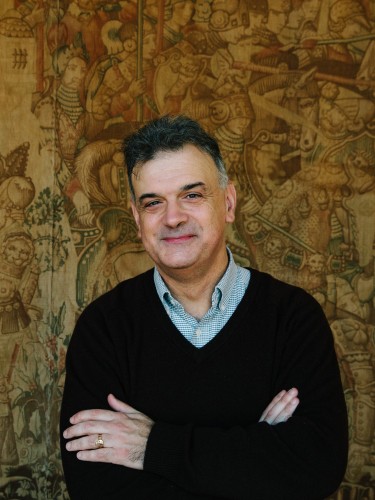
Christopher M. McDonough holds the Alderson-Tillinghast Chair in the Humanities. He teaches a wide range of courses at Sewanee, including Latin language and literature, mythology, literature in translation, and Classics in Cinema. He has been chair of both the Department of Classical Languages and the interdisciplinary humanities program. Before coming to Sewanee in 2002, McDonough taught at Boston College, Princeton University, Harvard Divinity School, and the University of North Carolina at Greensboro.
Gailor Hall 20, Ext. 1520
Stephanie McCarter, professor of Classics and Rachel Reynolds, German translator will speak about their experiences translating foreign texts-both ancient and modern.
Students were inducted into the national Classics honor society, Eta Sigma Phi for the first in-person gathering since COVID-19.
Stephanie McCarter's translation of Ovid's Metamorphoses will be published on November 8 by Penguin Classics. This is the first translation of the epic into English by a woman in over 60 years. You can read a recent interview with Professor McCarter about the translation.
Classics professor, Dr. Chris McDonough, with partner, Stephen Garrett have created the documentary, Ghosts of Lone Rock. There was a vast fortune to be made in the years after the Civil War from the untapped coal veins in eastern Tennessee, and all that was needed to extract it was a cheap source of labor. The owners of Tennessee Coal and Iron Company (TCI) worked with the state legislature to introduce the convict leasing system, in which the company would house convicts (mostly African-American) at its private prisons and force them to work in the mines virtually for free. The Lone Rock Stockade in Tracy City was the largest of these private prisons, and its story is one of great misery for many, and great profit for others has not been told on film. Until now.
Pontius Pilate on Screen: Sinner, Soldier, Superstar deals with one of history's most controversial characters. From Monty Python's Life of Brian to Mel Gibson's Passion of the Christ, Pontius Pilate is a figure of evidently endless fascination to filmmakers. The Roman prefect is depicted at times as the hapless victim of machinations beyond his control and at other times as the heartless villain of the piece. If in films about the Passion Jesus represents eternal truth, Pilate symbolises the values of the present; whether it is the lingering trauma of the Holocaust, the ongoing struggle over Civil Rights or the polarised politics of the current day; as filmmakers endeavour again and again to portray in Pontius Pilate a compelling counter-figure to Jesus himself
Dr. Holmes's book, Philosophy, Poetry, and Power in Aristophanes's Birds (Cambridge 2018), was favorably reviewed in the Classical Journal.
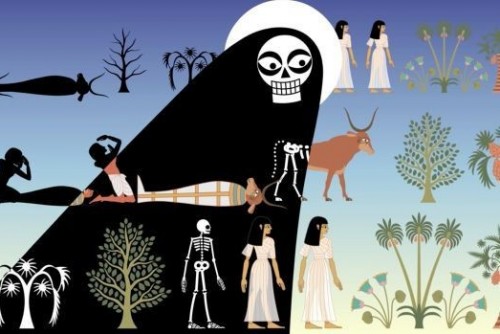
If you have not heard of Nina Paley, you are not alone. “America’s Best-Loved Unknown Cartoonist” is what she sometimes calls herself on her own website, and a big part of the reason for Paley’s relative lack of reputation lies in her status as a “free culture” activist. She is the artist-in-residence at the nonprofit organization QuestionCopyright.org, and has even given a TED talk on the topic, whose title–“Copyright Is Brain Damage”–gives a good indication of her generally derisive tone toward most of society’s sacred cows.
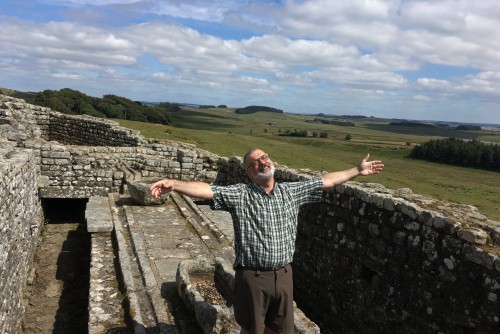
Professors Jim Crawford and Chris McDonough took a group of eight students on the Sewanee-in-England program last summer, where they spent time in London, York, Chester, and at Hadrian's Wall. Students had a good time talking with Kamila Shamsie, the author of Home Fire (an updated version of Antigone set among the Pakistani community in London).

Since 1988, European Studies has provided a unique and rewarding full semester abroad by offering distinct program options: Ancient Greece and Rome: the Foundations of Western Civilization, and Europe in the Middle Ages and the Renaissance, and (new for 2019) Contemporary Europe. Each option allows students to immerse themselves in a specific period in European civilization.

Stephanie McCarter, a professor of classical languages, explores the story of Icarus and other characters from Greek mythology which inspired the 2017 Gucci Gift Catalogue. Her commentary explores the relevance of Greek mythology for the contemporary. "These old Greek stories were never meant to be static. Atlas can mirror our own workday exhaustion, Artemis the refusal to conform to the traditional expectations of one’s gender."
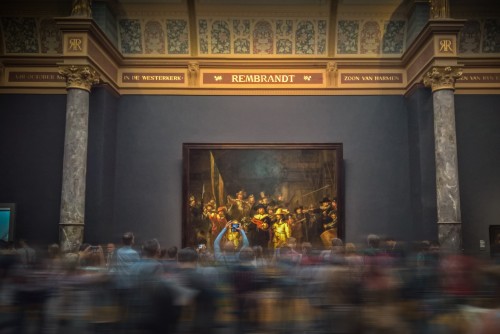
What means do we use to understand our world? How do we document our progress and process the encounters in our lives? The humanities is a broad field of study that gives us a glimpse into the past while instructing us on how to apply that insight to our current experience. Sewanee's team-taught, interdisciplinary humanities program will introduce you to the cultural products and practices that have informed the development of Western cultures.